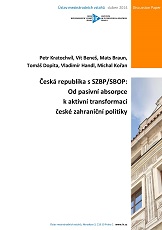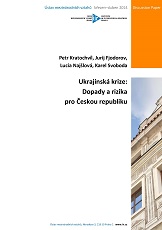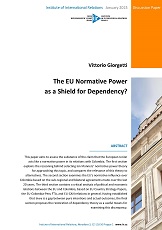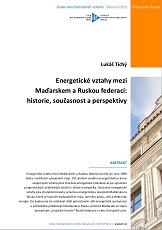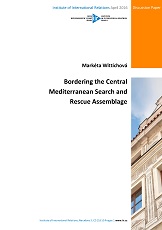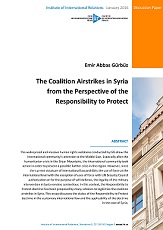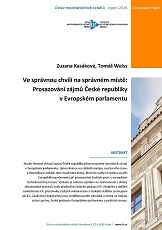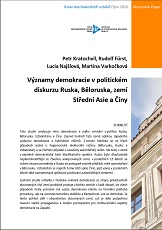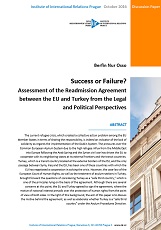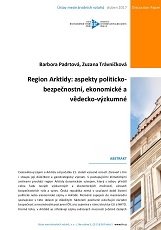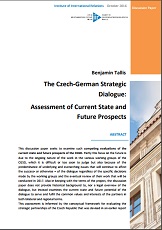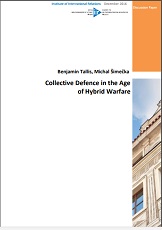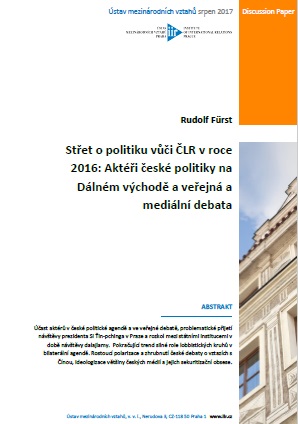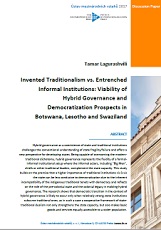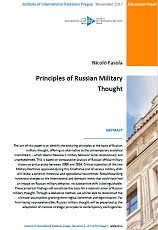Ukrajinská krize: Dopady a rizika pro Českou republiku
Author(s): Petr Kratochvíl,Yury Fedorov,Lucia Najšlová,Karel Svoboda / Language(s): Czech
Keywords: Ukrainian Crisis;
Východiska: Ukrajinská krize představuje nejzávažnější narušení mezinárodního řádu v Evropě za poslední dvě desetiletí. Nebezpečnost krize spočívá v bezprecedentním narušení mezinárodního práva v kombinaci s ústupem od občanského principu k etnicky založené politice. Tato strategie může snadno vyostřit řadu zamrzlých konfliktů v postsovětském prostoru (Náhorní Karabach, Podněstří), ale také obnovit obavy z národnostních požadavků jinde (Pobaltí, a dokonce i maďarské menšiny). Krize je provázena faktickým hospodářským kolapsem Ukrajiny a špatně skrývanou recesí v Rusku, kterou dále umocní sankce Západu a vzrůstající izolace země. Výsledkem tak může být prudké chudnutí regionu, spojené s nárůstem emigrace, sociální nestability a politické nejistoty. Ačkoliv jsou potenciální socioekonomické i bezpečnostní dopady na ČR zcela zásadní, není reakce české diplomacie jednotná – od požadavku prezidenta Zemana ohledně intervence NATO na Ukrajině na straně jedné až po velmi zdrženlivý postoj premiéra Sobotky na straně druhé. Řada politiků (zejména ODS, ČSSD) navíc žádá, aby se ČR neodkláněla od prioritizace ekonomické diplomacie. Česká veřejnost dlouhodobě nejeví o Ukrajinu zájem a ačkoliv tento nezájem ustoupil v souvislosti s krizí do pozadí, pouze 14 % českých občanů souhlasí s aktivním zapojením české diplomacie do řešení konfliktu. Veřejnost vnímá kritičtěji případné zapojení USA (70 % proti) než angažmá Ruska (58 % proti), a většina nepodporuje dokonce ani zapojení Evropské unie (47 % pro). Ekonomické a sociální dopady dopady Z ekonomického hlediska by pro ČR byly podstatnější ekonomické problémy Ruska (2014: pokles o 1,8 %) než pokračující hospodářské potíže Ukrajiny (2014: pokles o 3 %). Přesto se ale například jenom v únoru 2014 český export na Ukrajinu propadl o 28 % a další propad je možno očekávat v nejbližší době. Další vyostřování konfliktu a zejména uvalení sankcí na Rusko by ale mohlo znamenat ještě prudší pokles prodejů v Rusku. Pokles rublu o takřka 8 % od počátku roku představuje ohrožení pro automobilky (Škoda, Hyundai), ale i celou řadu dalších podniků (např. Hamé – 25 % zahraničních tržeb z Ruska). Již probíhající obchodní válka mezi Ruskem a Ukrajinou naproti tomu nemá přímé důsledky pro českou ekonomiku, ale dále snižuje možnosti českého exportu do obou zemí. Z energetického hlediska bude důsledkem krize nepochybně rostoucí diverzifikace dodavatelských i tranzitních zemí, které ovšem nelze dosáhnout v krátkodobém horizontu. ČR hraje důležitou roli v reverzním toku plynu na Slovensko a případně dále na Ukrajinu, nicméně v okamžiku krize je přeprava plynu na Ukrajinu nepravděpodobná vzhledem ke snaze zajistit vlastní českou a slovenskou spotřebu. Navzdory současnému pozastavení projektu South Stream by cílem české politiky nemělo být plně se zříci ruského plynu, ale vytvořit systém, který umožní dodávky v případě dlouhodobého výpadku nahradit. Je třeba připomenout, že ruský plyn je pro evropské odběratele výrazně levnější než alternativní plyn z LNG terminálů. V případě další eskalace konfliktu je možné očekávat masivní vlnu migrace z Ukrajiny, na kterou nejsou sousední země, ale ani Česká republika připraveny. Vnímání ukrajinské menšiny v zemi (která je s více než 100.000 lidmi vůbec největší menšinou) je navíc již dnes velmi negativní – Ukrajinci patří mezi nejhůře vnímané menšiny, a jejich hodnocení je dokonce nižší než v případě menšiny ruské. Bezpečnostní dopady Míra ohrožení bezpečnosti ČR a jejích spojenců (např. Pobaltí) závisí na odpovědi na otázku, a) jaké jsou dlouhodobé cíle Putinova režimu a b) zda jsou současné ruské kroky součástí širší strategie, anebo zda se jedná o spíše intuitivní obranu údajných ruských zájmů v regionu. Rozlišujeme přitom tři základní scénáře: scénář finlandizace Ukrajiny (omezená míra eskalace) scénář velkého Ruska (střední míra eskalace) scénář masivní expanze (vysoká míra eskalace) V prvním případě je cílem Putinova režimu především odvést pozornost od narůstajících domácích hospodářských problémů a současně zabránit přičlenění Ukrajiny k vnitřnímu trhu EU. Putinova strategie se tak vyčerpává anexí Krymu a federalizací, neutralizací a celkovou finlandizací Ukrajiny. V druhém případě jsme svědky pokusu o sjednocení ruskojazyčného obyvatelstva v celém regionu, v půlměsíci od separatistických oblastí v Gruzii přes jižní a východní Ukrajinu až po Podněstří. Tento scénář staví Krym do pozice vojenského předmostí, z nějž může Rusko přímo i nepřímo ovládat jižní a východní Ukrajinu a Moldavsko. Případná anexe Podněstří je přímo vázána na anexi některých regionů Ukrajiny (Oděská oblast), jež jsou pro infrastrukturní spojení s Podněstřím zcela nezbytné. Pravděpodobnost tohoto scénáře posiluje (1) pokračující destabilizace na jihovýchodní Ukrajině, (2) závislost ruského obranného programu na vojensko-průmyslových podnicích v této části Ukrajiny a (3) všeobecná zranitelnost Krymu (absentující infrastruktura, závislost na dodávkách plynu (25 %), vody (70 %) i elektrické energie (90 %) z ukrajinské pevniny). Již nyní je patrná rychlá militarizace Krymské poloostrova (a to jak pozemních jednotek, tak i černomořské flotily, a dokonce - do roku 2016 - i bombardérů TU-22M3 s jadernými hlavicemi). Scénář masivní expanze představuje zásadní reorientaci ruské politiky vůči celému regionu zacílenou na anexi Běloruska a případně též Moldavska a Pobaltí. Tento scénář je v současnosti pouze hypotetický a jeho uskutečnění by bylo závislé na úspěšnosti předchozích dvou scénářů. Přesto jsou ovšem zejména země Pobaltí mimořádně zranitelné, a to jak kvůli své geografické poloze, tak i kvůli ruskojazyčným menšinám se statusem „neobčanů“ v těchto zemích. Proto se jeví jako klíčové poskytnout ohroženým zemím maximální podporu (počínaje diplomatickou podporou přes přehodnocení plánu Eagle Guardian až po rozmístění kontingentů NATO v pobaltských státech, pokud o to budou tyto země usilovat).
More...
